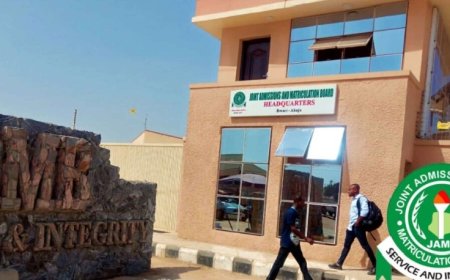Nigerian Polytechnic Students Reject Tinubu’s Approval For Conversion Of YABATECH To University

In a significant development within Nigeria's educational landscape, President Bola Tinubu has approved the conversion of Yaba College of Technology (YABATECH) into a university. This decision, announced by the Minister of Education, Dr. Tunji Alausa, during a working visit to the institution on February 14, 2025, has sparked a spectrum of reactions, notably opposition from the National Association of Polytechnic Students (NAPS).
Presidential Approval for Conversion
During his visit, Dr. Alausa conveyed the President's swift endorsement of the conversion. He remarked, "The rector mentioned earlier that the staff, students, and management of the college have been praying and fasting for its conversion to a university. When I discussed the issue with President Bola Tinubu, he promptly approved it. We are now awaiting the official memo and necessary protocols from the appropriate authorities."
The Minister lauded YABATECH's legacy and its substantial academic resources, highlighting that over 200 staff members hold doctorate degrees across various disciplines. This academic strength, he noted, positions the institution aptly for its new status as a university.
YABATECH's Vision for the Future
Rector Dr. Ibrahim Abdul expressed enthusiasm about the transition, emphasizing the institution's commitment to evolving into a university of technical and vocational education. He stated, "We aspire to be a university that brings innovation, addresses societal challenges, and significantly contributes to the advancement of our nation. With over 200 PhD holders on our staff, we have the manpower; we now seek the government's support to realize this vision."
Opposition from Polytechnic Students
Contrasting the institution's optimism, the National Association of Polytechnic Students (NAPS) has voiced strong opposition to the conversion. In a statement released on February 15, 2025, NAPS contended that transforming YABATECH into a university could undermine the distinctive, hands-on approach that polytechnic education offers. The association emphasized that such a move might erode the core strengths essential for Nigeria's industrial growth.
NAPS President, Eshiofune Oghayan, articulated concerns that the conversion could shift the institution's focus from practical, industry-oriented training to a more theory-based curriculum. He argued that polytechnics play a crucial role in bridging the gap between theoretical knowledge and industrial application, fostering innovation and problem-solving skills vital for the nation's economic diversification.
Advocacy for HND to B.Tech Transition
Rather than converting polytechnics into universities, NAPS advocates for the implementation of a Higher National Diploma (HND) to Bachelor of Technology (B.Tech) transition. This approach, they argue, would grant polytechnic graduates internationally recognized degrees, enhancing their competitiveness in the global job market while preserving the practical essence of polytechnic education.
Oghayan stated, "The HND to B.Tech transition is the most viable path to improving the status of polytechnic education while preserving its technical essence. This would ensure that polytechnic graduates receive the recognition they deserve without compromising the practical and industry-focused training that makes them valuable to the economy."
Call for Policy Reforms
In addition to opposing the conversion, NAPS has called for the transformation of the National Board for Technical Education (NBTE) into a Polytechnic Education Commission. This change, they believe, would elevate the status and authority of polytechnic education in national planning, ensure adequate funding, and establish clear pathways for career progression and professional development for polytechnic graduates.
The association has urged the Federal Government to engage with stakeholders, including NAPS and NBTE, to develop a comprehensive reform agenda aimed at repositioning polytechnic education as a driving force for economic development. They emphasized their readiness to collaborate in formulating policies that empower Nigeria's workforce, drive industrialization, and secure a prosperous future for the nation.
Appeal to the Presidency
NAPS has made a direct appeal to President Tinubu to reconsider the decision to convert YABATECH into a university. They advocate for a focus on revamping and modernizing technical education to produce the next generation of innovators, skilled professionals, and industrial leaders, rather than eliminating polytechnic institutions.
Oghayan cautioned, "We will not fold our arms and watch as the government undermines the future of polytechnic education in Nigeria. We will mobilize our members to resist this move and ensure that the government prioritizes the development of polytechnic education."
Conclusion
The decision to convert YABATECH into a university has ignited a critical discourse on the future of technical and vocational education in Nigeria. While the government and the institution's management view the transition as a progressive step, the opposition from NAPS underscores the need for a nuanced approach that balances the elevation of educational standards with the preservation of the practical training essential for the nation's industrial and economic development.





































